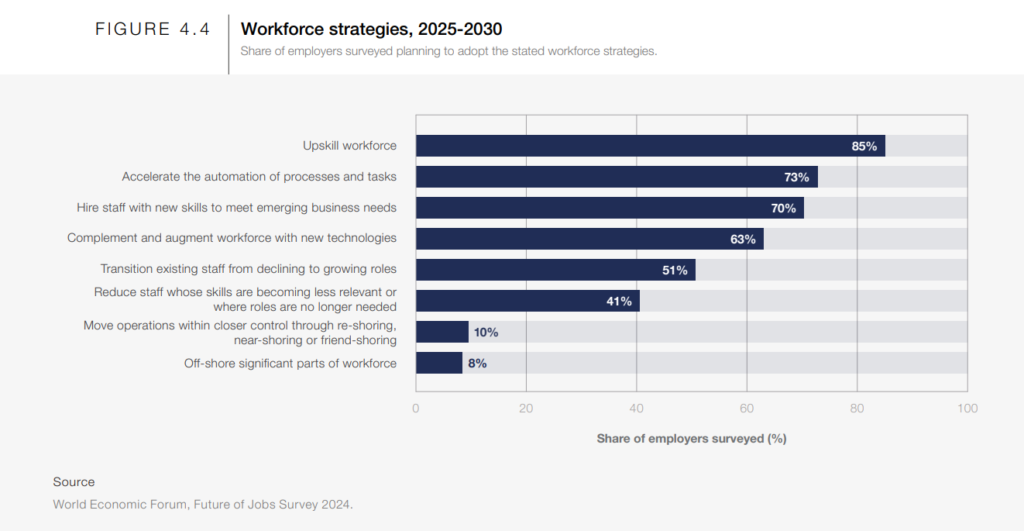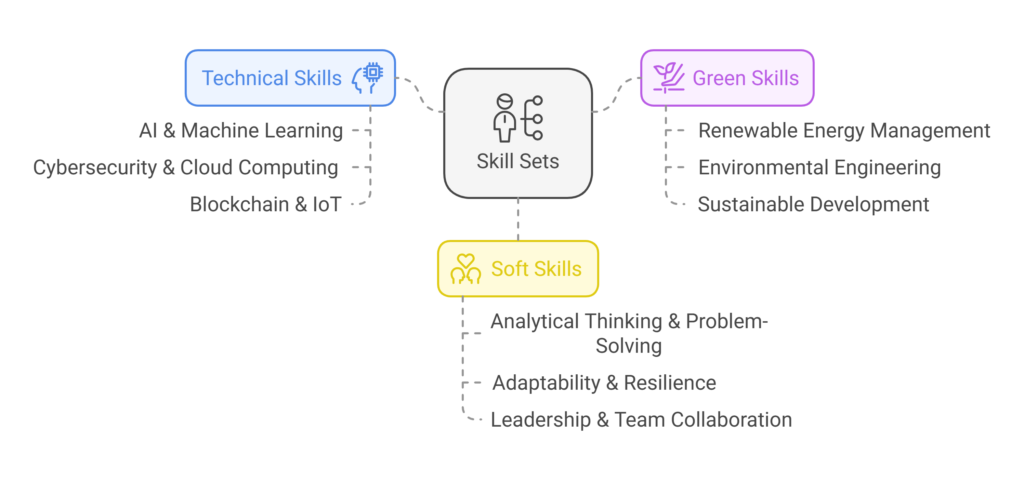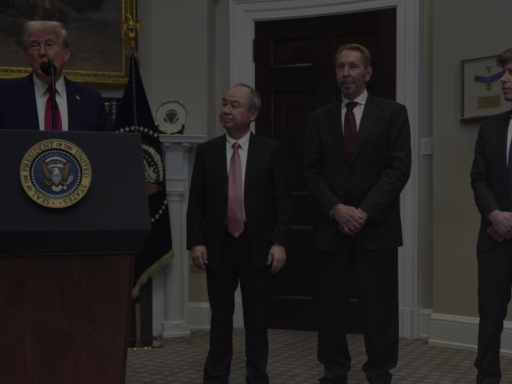The workforce in the MENA region is undergoing a profound transformation driven by technology, economic shifts, and demographic changes. The World Economic Forum’s Future of Jobs Report 2025 highlights these global trends and provides insights into how labor markets are evolving.
For MENA professionals, the ability to adapt to automation, artificial intelligence (AI), and sustainability-driven industries will be crucial. This article explores key findings from the report, the most in-demand skills, and workforce strategies tailored to the MENA region.
The Global Drivers of Workforce Transformation

Technological Change
AI and automation are rapidly reshaping industries worldwide. Companies across MENA are increasingly integrating AI-driven solutions into their operations, leading to a rise in demand for AI specialists, data analysts, and cybersecurity experts. A report from McKinsey & Company emphasizes how AI will create new job opportunities while displacing traditional roles.
Economic Uncertainty
Inflation, supply chain disruptions, and fluctuating oil prices impact hiring trends. The World Bank’s economic forecast for MENA underscores the need for economic diversification, particularly in non-oil sectors.
Geoeconomic Fragmentation
Trade restrictions and investment policies are influencing job markets. The UAE and Saudi Arabia are adapting by investing in local tech and innovation hubs to reduce reliance on imports and create employment in emerging sectors.
The Green Transition
Climate policies are driving demand for sustainable energy jobs. According to the International Renewable Energy Agency (IRENA), MENA could become a global leader in solar energy, opening up roles in environmental engineering and renewable energy sectors.
Demographic Shifts
With a young and growing workforce, MENA faces a unique opportunity. Countries like Egypt and Saudi Arabia are investing in educational reforms to ensure young professionals are equipped for the digital economy.
MENA’s Job Market Outlook

Expected Job Growth vs. Job Losses
- Growing Sectors: AI, fintech, renewable energy, e-commerce, and digital marketing.
- Declining Sectors: Clerical jobs, manual labor, and traditional administrative roles due to automation.
Industries Most Affected
Technology and AI-driven Sectors
- Fintech: The UAE and Bahrain are emerging as fintech hubs, creating opportunities for blockchain developers and cybersecurity specialists.
- AI Engineering & Cybersecurity: Governments are investing in AI as part of digital transformation strategies (Saudi Vision 2030).
Renewable Energy and Sustainability Jobs
- Green Energy Engineers: With MENA’s solar energy potential, roles in renewable energy engineering are on the rise.
- Environmental Policy Analysts: Organizations need professionals to navigate evolving sustainability regulations.
E-commerce & Automation in Traditional Industries
- Logistics & Supply Chain Specialists: The rise of online retail in MENA is fueling demand for logistics managers and automation experts.
- Customer Experience Managers: Companies are prioritizing AI-driven personalized experiences, necessitating digital marketing expertise.
The Most In-Demand Skills in MENA by 2030

Platforms like Coursera and Udacity are increasingly popular among MENA professionals. Government-backed programs in Saudi Arabia and the UAE offer also AI and tech-focused upskilling courses.
Workforce Strategies for MENA Employers
Bridging the Skills Gap
- Companies are partnering with universities to develop AI and digital-focused curriculums.
- Workforce retraining initiatives are gaining traction, with governments offering incentives for tech-based reskilling.
The Role of Governments and Private Sector in Talent Development
- Initiatives like the UAE’s National AI Strategy 2031 are shaping the future of work.
- Saudi Arabia’s investments in AI research aim to create over 20,000 new jobs in AI by 2030.
Diversity, Equity & Inclusion Initiatives
- Women in STEM programs are gaining momentum, helping bridge gender gaps in tech roles.
Hybrid Work Models and Digital Workspaces
- Remote work and AI-augmented jobs are becoming standard, leading to increased demand for remote collaboration tools and cybersecurity.
Preparing MENA’s Workforce for the Future
The Role of Education and Vocational Training
- Universities are adapting curriculums to align with future job market needs.
- The rise of vocational training in sectors like AI, robotics, and cybersecurity is equipping professionals with relevant skills.
- Saudi Vision 2030: Prioritizing AI, robotics, and smart city initiatives.
- UAE Digital Economy Strategy: Aiming to double the contribution of the digital economy to GDP by 2031.
- Platforms like Upwork and Toptal are enabling professionals to work remotely, expanding opportunities beyond traditional employment structures.
- The startup ecosystem in MENA is booming, with increased venture capital investments in fintech and AI-driven solutions.
Key Takeaways
- To remain competitive, MENA’s workforce must embrace AI, green technology, and digital transformation.
- Government policies and private sector investments are key to bridging skill gaps and fostering innovation.
- Professionals must engage in lifelong learning to navigate the evolving job landscape.
As MENA undergoes rapid transformation, individuals and businesses must proactively adapt. Continuous learning, upskilling, and leveraging new opportunities in AI, digital transformation, and sustainability will be essential for success in the region’s future job market.





